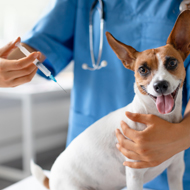The expanded scope takes a One Health approach.
The World Organisation for Animal Health (WOAH) has expanded the scope of its antimicrobial resistance (AMR) standards and guidelines for the animal sector.
WOAH says that the complex issue requires a One Health approach, such as the inclusion of companion animals and environmental safeguards in their guidelines.
Although antimicrobial drugs have benefitted global health significantly over the past years, the widespread use of them has led to the emergence of drug-resistant pathogens. This AMR is threatening both animal and human health, with additional repercussions across the interconnected ecosystems.
To keep up with the challenges of combatting AMR, WOAH’s International Standards are revised annually at its General Session to ensure that they are agreed among its members and grounded in scientific research.
The decision to include companion animals in the organisations’ standards to combat AMR follows an increasing global trend of pet ownership, with over one billion companion animals being kept worldwide. This has been studied extensively, revealing evidence of a bi-directional transfer of resistant pathogens between humans and their pets.
The organisation hopes that this will not only raise awareness among its members but also, through collaboration with the World Small Animal Veterinary Association, encourage good practice among pet owners.
Environmental dimensions of AMR have also influenced WOAH’s newly expanded standards.
WOAH says that the environmental impact of antimicrobials has been previously overlooked. However it says considering the environment is of critical importance to combatting AMR.
As such, environmental risk assessments should be conducted within the pharmaceutical industry when approving veterinary medicines. In addition, manufacturers should provide instructions for the safe disposal of medicine.
Finally, WOAH has emphasised the importance of specific recommendations for the use of antimicrobial medicines. It has therefore updated its list of antimicrobial agents of veterinary importance, to align its recommendations with changes made by the World Health Organisation.
The organisation hopes that the newly expanded standards will lead to more responsible antimicrobial use across different animal health contexts.
Stephen Page, a member of the AMR Working Group, said: “This is an important step forward in the fight against the deadly threat of AMR.
“For many years there has been considerable interest in the appropriate use and stewardship of antimicrobials within the small animal community worldwide. Aligning this interest with the global standards and actions of WOAH is a crucial to unlocking the One Health potential."
WOAH's International Standards can be found here.
Image © Shutterstock



 RUMA CA&E has extended the deadline for its online survey into vaccine availability.
RUMA CA&E has extended the deadline for its online survey into vaccine availability.